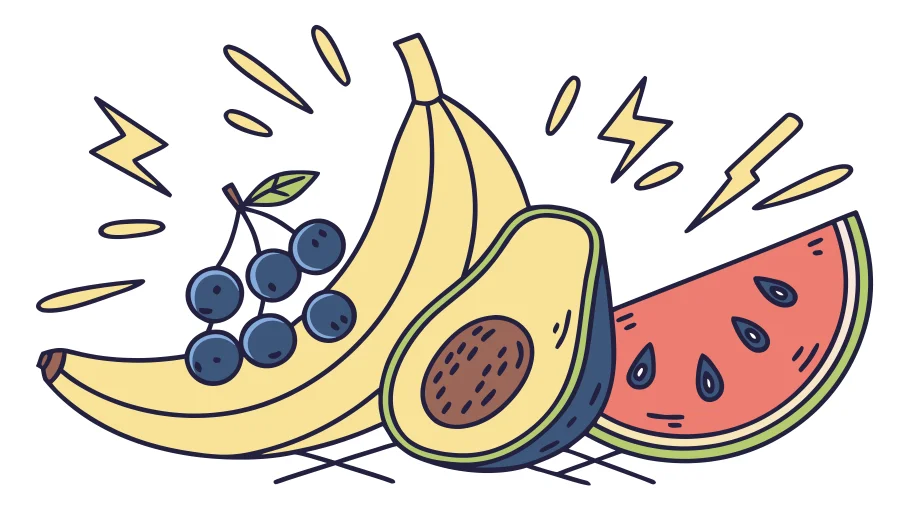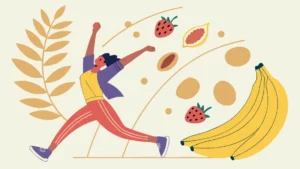When afternoon fatigue strikes, many reach for caffeine or snacks. But nature has a better option. Energetic fruits provide lasting energy without the crash. They mix natural sugars, fiber, and important nutrients. This combination energizes your body better than regular snacks.
The Science Behind Energy Fruit Power
Fruits give lasting energy by fueling our cells, which convert food into usable energy. This process depends on ATP (adenosine triphosphate) production, which occurs during cellular respiration. Here, glucose from fruits undergoes complex reactions in your mitochondria.
Fruits contain sugars like fructose and glucose, plus fiber, for steady energy. Natural sugars work better together than refined sugars, which cause quick spikes and crashes in blood sugar. The difference is in how they are absorbed and metabolized.
How Fructose Differs from Refined Sugar
Fructose mainly comes from fruits and is processed in the liver. It doesn’t cause significant insulin spikes like refined sugars do. This unique pathway shows why whole fruits provide steadier energy than processed options. Research supports this link to metabolic health.
Fruits also contain B-vitamins, potassium, and antioxidants, which aid energy production. B vitamins act as coenzymes in energy metabolism, turning nutrients into ATP. Potassium is crucial for nerve and muscle function. Antioxidants protect mitochondria from oxidative damage, supporting energy creation.
7 Top Fruits to Increase Stamina
1. Bananas: The Ultimate Natural Electrolyte Source
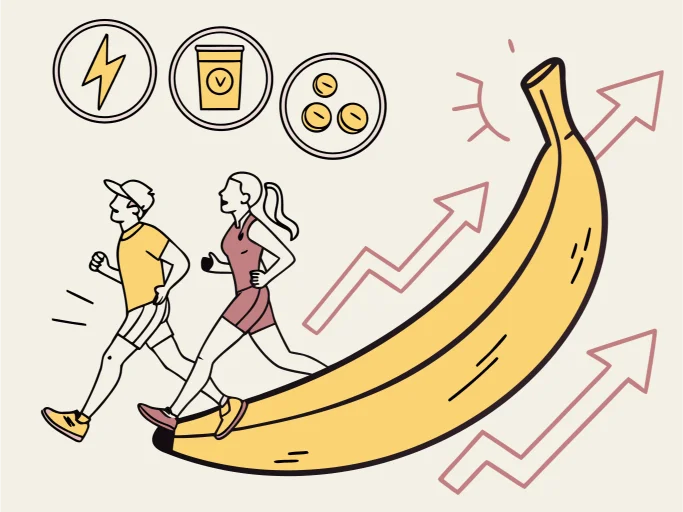
Bananas are nature’s best sports drink. A medium banana has 422mg of potassium, more than many sports drinks. Their mix of fast and slow-digesting carbs, along with 3g of fiber, creates optimal energy release.
Key Benefits:
- Raises plasma potassium for up to 60 minutes
- Aids glycogen replenishment after exercise
- Provides quick fuel while preventing blood sugar crashes
Research shows that bananas can significantly boost athletic performance through better electrolyte balance and lasting energy.
2. Dates: Concentrated Energy Gems
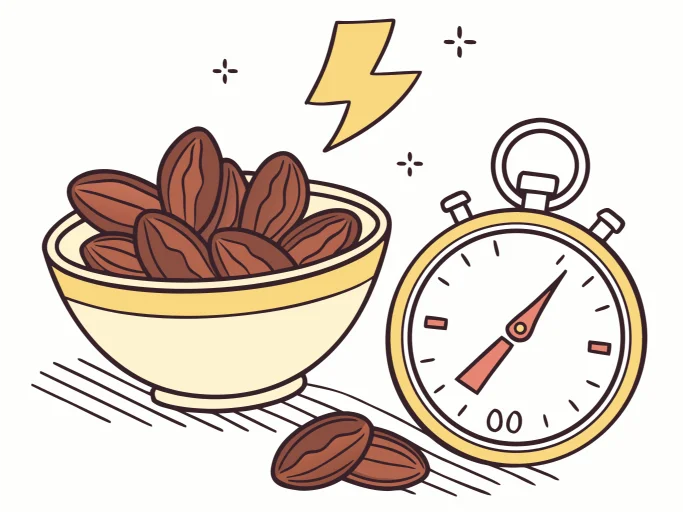
Dates offer exceptional slow-release carbs with a low glycemic index, making them great for endurance athletes. Studies show low-GI diets can boost performance by 1.9-2.82% through better fat oxidation and stable glucose levels during exercise.
Dates provide steady energy without the blood sugar swings of high-GI options, making them ideal for pre-workout fuel or afternoon boosts.
3. Oranges: Immune-Boosting Citrus Power
Oranges are known for their vitamin C (32-42mg per 100ml) and boost immunity. The vitamin C supports blood flow, while citrus flavonoids reduce oxidative stress and fatigue.
This makes oranges excellent for immediate energy and long-term stamina.
4. Apples: Blood Sugar Balance Champions
Apples help balance blood sugar with their mix of pectin fiber and polyphenols. One medium apple has 4g of fiber, slowing sugar absorption. Apple polyphenols help regulate glucose levels.
Research shows that eating an apple before meals can lower blood sugar spikes, making them great for sustained energy.
5. Blueberries: Antioxidant-Rich Cognitive Enhancers
Blueberries are packed with antioxidants that boost cognitive function and physical performance. Eating 75-80 blueberries daily improves memory, reaction times, and executive function.
The anthocyanins in blueberries provide neuroprotective effects and support recovery, making them vital for both mental and physical stamina.
6. Avocados: Fat-Fueled Sustained Energy
Avocados offer sustained energy through their monounsaturated fats and fiber. Replacing carbs with avocado fats can enhance satiety hormones while providing more energy per gram than carbs.
This makes avocados perfect for lasting energy without frequent refueling.
7. Watermelon: Hydrating Recovery Fuel
Watermelon is great for post-workout hydration, containing 92% water and the amino acid L-citrulline. Studies show watermelon juice can reduce muscle soreness and improve heart rate recovery after exercise.
Citrulline helps clear lactic acid faster, aiding recovery and preparing your body for more energy demands.
Building the Best Afternoon Snacks
Pairing energetic fruits with protein and healthy fats creates snacks that stabilize energy levels. The fiber in fruits slows sugar absorption, while protein and fat help keep you full, preventing that 3 PM energy crash.
Power-Packed Combinations
Try these best afternoon snacks:
- Apple slices with almond butter – fiber, protein, and healthy fats for lasting energy
- Greek yogurt parfait with berries – sustained protein and antioxidants for brain function
- Avocado toast with sliced banana – healthy fats plus quick energy and potassium
- Trail mix with dried fruits and nuts – portable energy for busy days
- Watermelon with cottage cheese – hydration and protein for recovery
Research shows that people who eat fresh fruit instead of processed snacks have better energy, cognitive function, and less afternoon fatigue. Natural sugars in fruit provide steady mental clarity without the crashes linked to refined sugar.
For more energy strategies, check our guide on foods that naturally increase energy and tips to boost energy throughout the day.
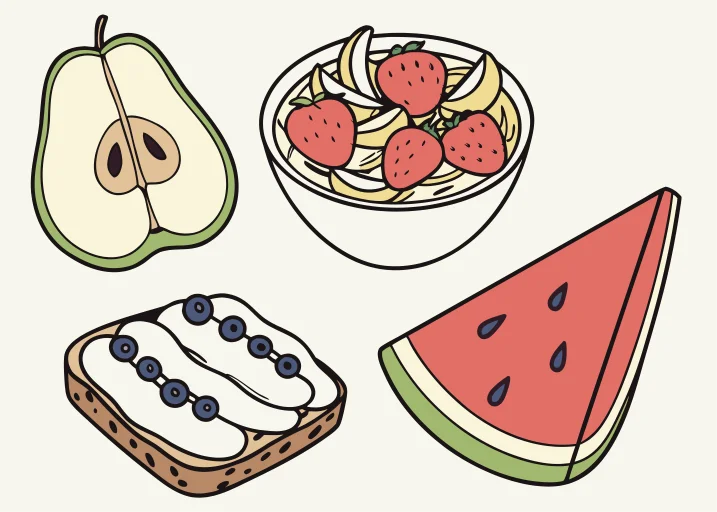
Energetic Fruits and the “Eat to Beat Disease” Food List
Dr. William Li’s “Eat to Beat Disease” framework identifies five defense systems that fight chronic illness: angiogenesis, regeneration, microbiome, DNA protection, and immunity. Energetic fruits play vital roles in these systems, making them key to the eat to beat disease food list.
Five Defense System Support
Angiogenesis Support: Fruits like apples and berries help form healthy blood vessels while inhibiting harmful angiogenesis. Their polyphenols support vascular health.
Regeneration Enhancement: Antioxidants and vitamins in fruits boost stem cell function and repair. Blueberries, in particular, promote neurogenesis and cognitive recovery.
Microbiome Balance: Fiber-rich fruits like apples and pears act as prebiotics, feeding good gut bacteria and aiding digestion. Apple pectin promotes gut health.
DNA Protection: The vitamin C, polyphenols, and antioxidants in fruits help repair oxidative DNA damage and support telomere health. Eating fruit is linked to less cellular aging and longer life.
Immunity Strengthening: Vitamin C, antioxidants, and phytochemicals in fruits enhance immune function and reduce inflammation. This multi-system support makes fruits crucial for disease-prevention nutrition.
Understanding how these systems work together shows why adding diverse energetic fruits to your diet offers benefits beyond just energy. For the best results, pair fruit with strategies to improve stamina without running and maintain stable blood sugar and energy levels.
Frequently Asked Questions
Which fruit gives quick energy before a workout?
Bananas are the best pre-workout choice due to their fast-digesting carbs and potassium. Their natural sugars provide quick fuel while fiber helps prevent blood sugar crashes. Grapes and dates also offer great quick energy with concentrated natural sugars.
How many servings of energy fruit per day?
The Dietary Guidelines suggest 2-4 servings of fruit daily, with at least 50% as whole fruits. Active people may need 5+ servings spread throughout the day for energy and recovery. Focus on variety to maximize nutrients across colors.
Do high-sugar fruits spike insulin?
Natural fruit sugars, especially fructose, raise insulin levels less than refined sugars. Fiber slows absorption, preventing dramatic blood sugar spikes. However, portion control is important, especially for those with diabetes or insulin sensitivity.
Are dried fruits as effective for stamina?
Dried fruits pack in more nutrients and calories. They offer 3-4 times more energy per serving than fresh fruits. They have lots of antioxidants and minerals. But they don’t provide the hydration and volume that fresh fruits do. Fresh fruits help keep you full and manage blood sugar. Dried fruits are great for on-the-go energy, especially during endurance activities.
Turning Fruit into Functional Fuel
Energetic fruits are nature’s best energy source. They mix quick sugars with fiber and micronutrients for lasting energy. Whole foods help your body’s five defense systems. They also give you the energy you need for top performance. This is better than processed options.
The key is in choosing the right fruit at the right time. This means choosing fruit to boost your energy. You can use it for pre-workout power, afternoon energy, or recovery after exercise. Add these seven powerhouse fruits to your daily routine. They fuel your energy now and support your long-term health.
For better energy management, check out our resources on natural electrolytes. Also, look at foods that boost mitochondrial function. They can help maximize your body’s energy production.


